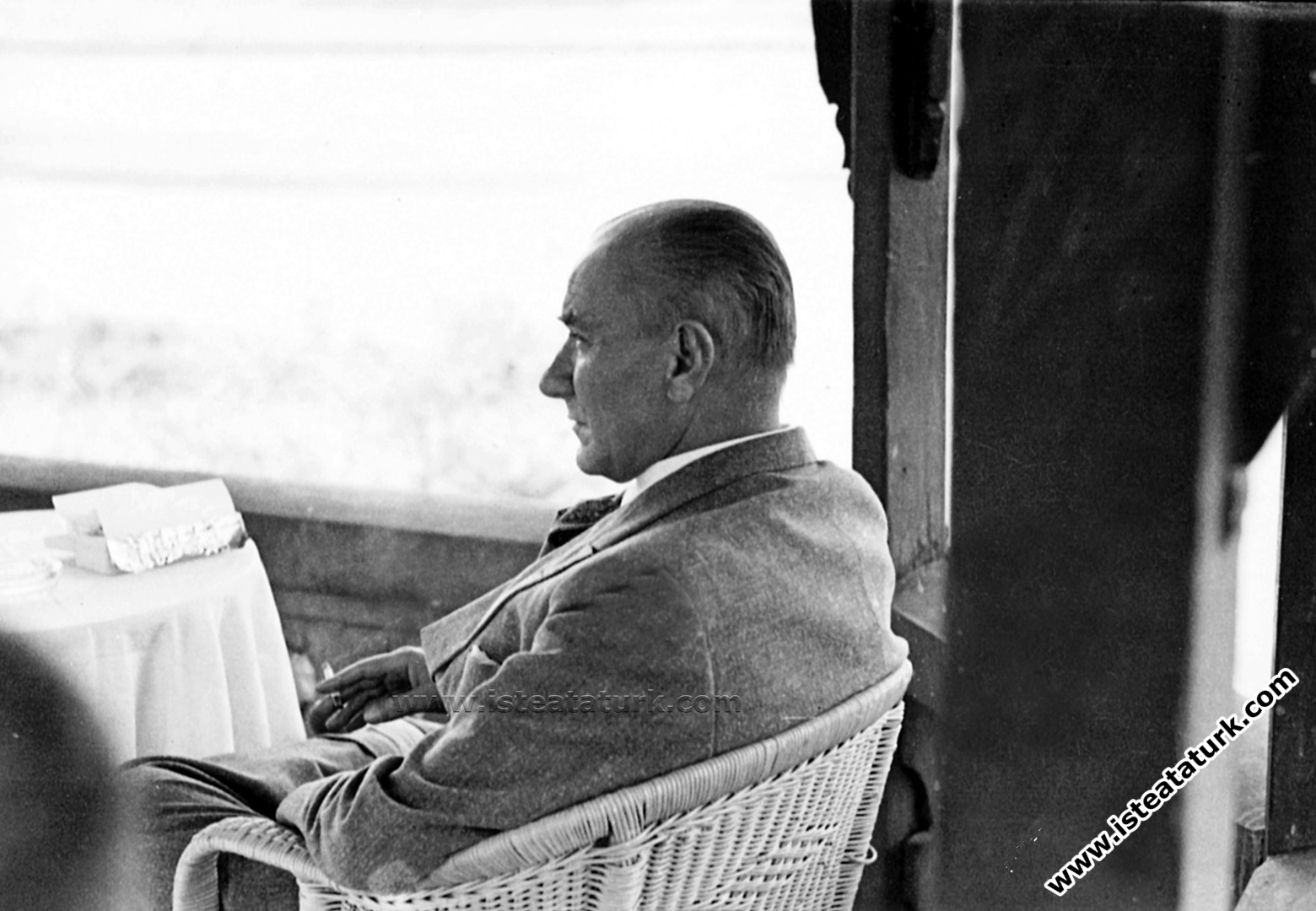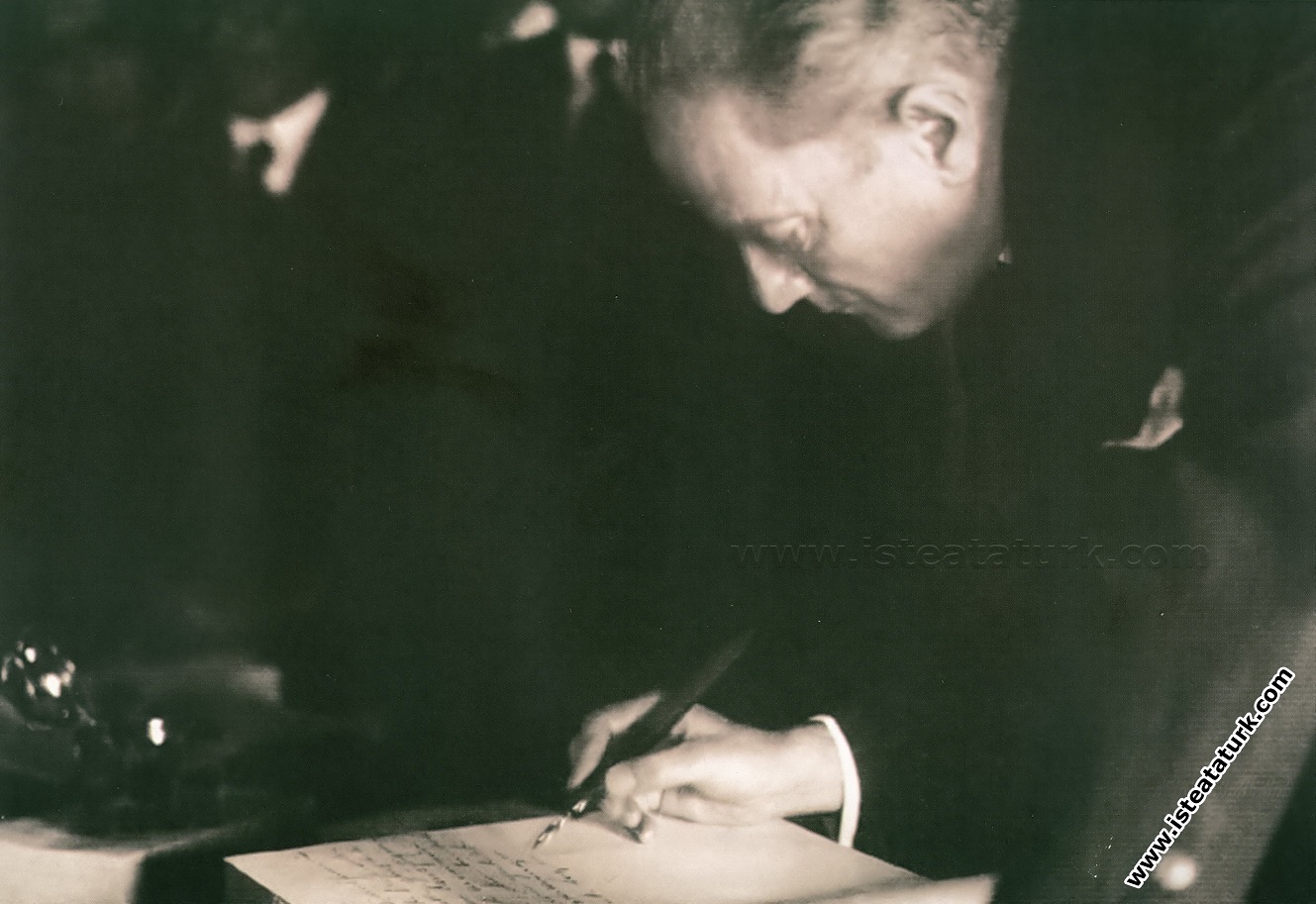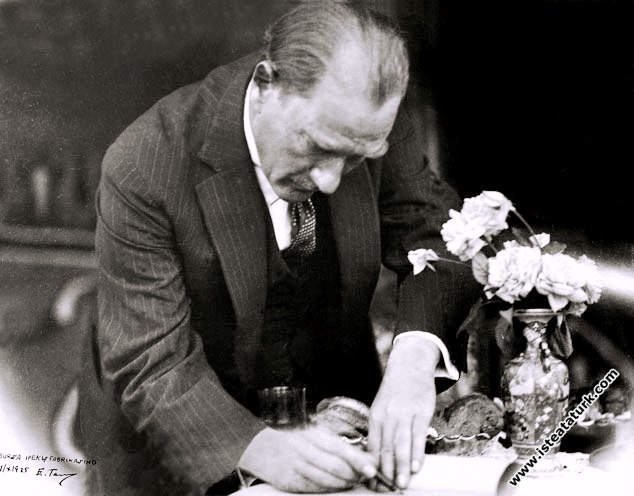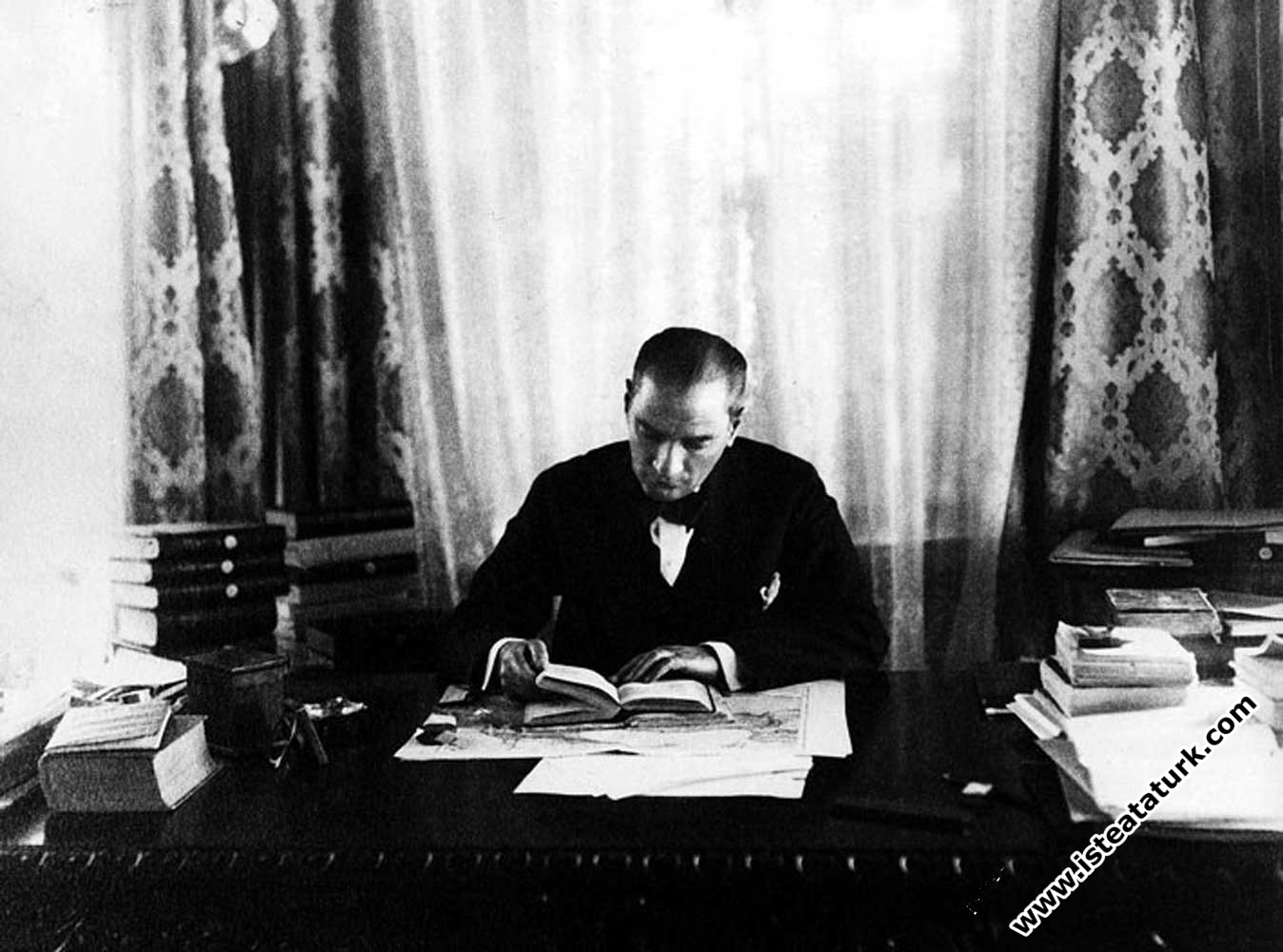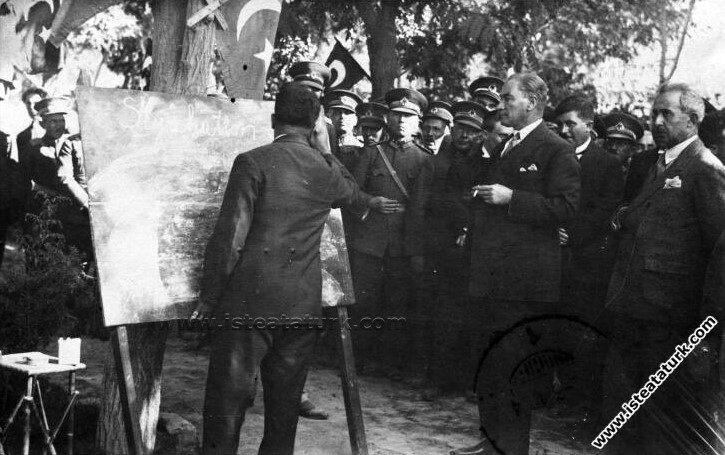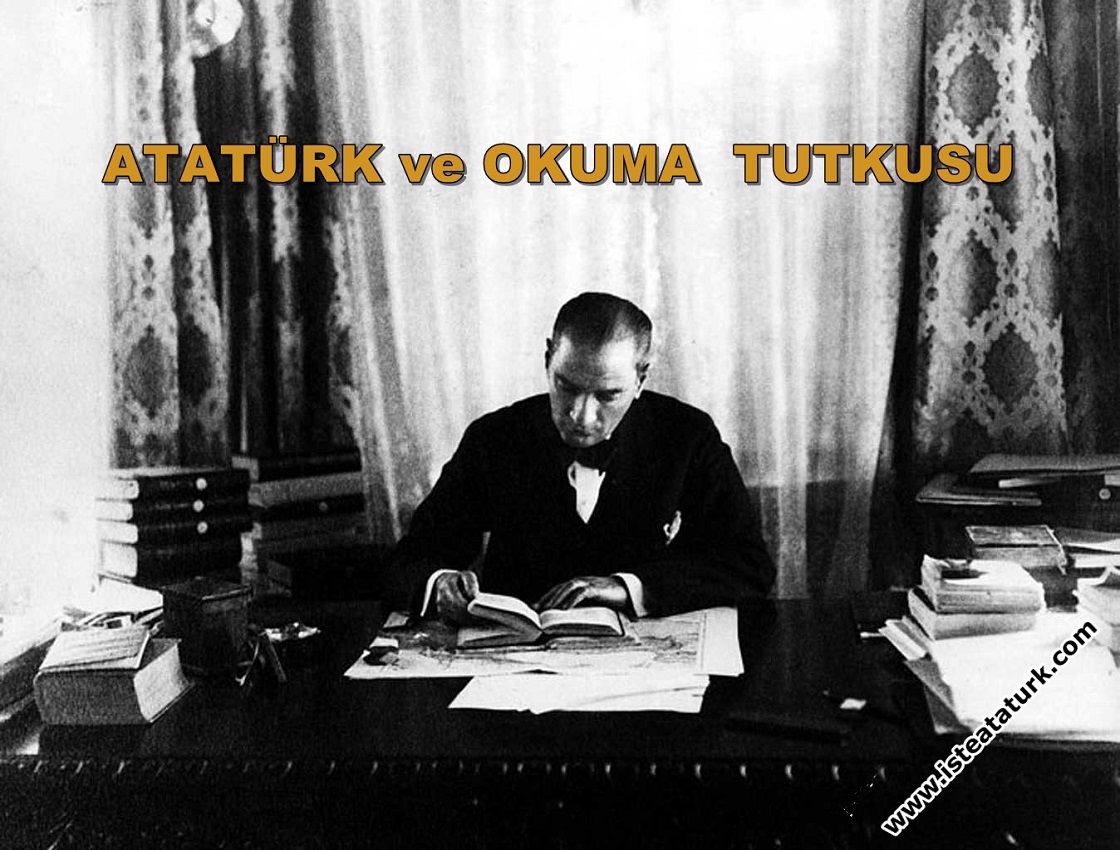
Passion for Reading in Atatürk
Character Size
“To be a man, it is necessary to read and learn. There is no other choice." Ali Rıza Bey.
ATATÜRK and READING PASSION
Undoubtedly, his military genius and his being a thinker as well as a statesman played a major role in Atatürk's being among the leading figures of our century. We can only learn what Atatürk read and how he read throughout his life, from those around him and from his own memories. Mustafa Kemal, who was born in Thessaloniki in 1881, came to the age of reading, his father Ali Rıza Bey said, “ To be a man, it is necessary to read and learn. There is no other choice. He encouraged him to read with his words, "1. Perhaps these words were an important factor in awakening little Mustafa's interest in reading and learning. We learn from the memories of his neighborhood friend, Asaf İlbay, that he preferred reading to playing on the street when he was still a primary school student.2
While continuing his education at the military secondary school, it is understood from the fact that the name of Mustafa Kemal is seen at the head of the competitions on science and mathematics, opened by a weekly magazine called "Kidslara Guide", which was published in Thessaloniki at that time, and that he was not content with only textbooks, but also watched local magazines and newspapers.3 Mustafa Kemal, Manastır. While attending Military High School, he was constantly reading and even memorizing Namık Kemal's works, Mehmet Emin (Yurdakul) and Tevfik Fikret's poems, which studied the concepts of homeland and freedom, apart from his lessons. On the other hand, with the help of his friend Fethi (Okyar), who spoke French very well, they were reading the works of thinkers who prepared the French Revolution, such as Voltaire, Rousseau, and Montesqiue, and were discussing their ideas.4 Since Mustafa Kemal understood the necessity and value of knowing a foreign language at that time, Not content with the French taught at school, he attended the private courses of the "College des Freres de la Salle" when he went to Thessaloniki during the summer holidays. During his education at the Military High School, the history teacher Mehmet Tevfik (Bilge) talked about the French Revolution, other events in the world and intellectual movements in his lectures, and aroused interest and love for history in him.5 This interest increased and lasted until the end of his life.
Atatürk's years of education at the Military Academy were the years he followed closely other publications in his field of interest, with the help of foreign languages he learned, especially history books that nourished his patriotic feelings and prepared his cultural background. On weekends, together with his friend Ali Fuat (Cebesoy), he would go to Zeuve Beer House, located right next to Galatasaray High School in Beyoğlu, read the foreign newspapers that came here for hours, and thus read the articles about the events in the world and the Ottoman Empire in the foreign press. 6 In his memoirs, Ali Fuat Cebesoy and Asım Gündüz, who were his classmates from the Military Academy and the Military Academy,78 especially the poems of Namık Kemal, Tevfik Fikret and Mehmet Emin Yurdakul, despite the prohibitions of the administration during their studentship, They write about how they secretly read at night in the dormitory. The well-known historian Prof. Enver Ziya Karal's determinations on the subject are as follows: “The first stage of Atatürk's inexhaustible energy is seen in his upbringing. He learned French by his own efforts and read works on politics, law and literature, as well as on military training, written in that language. Atatürk's curiosity about reading and learning will continue throughout his life.”9
During his years at the Military Academy, Atatürk begins to publish a handwritten newspaper at school in order to convey his political ideas and thoughts to his friends, which he brought to new dimensions. These attempts are soon understood by the school administration and they are punished for this reason. Atatürk had a short life as a journalist in the following years. While he was here, he translated from General Litzmann and wrote his books on military service.” Mustafa Kemal, who was appointed as a military attaché to Sofia in October 1913, spent his time outside of his official duties by reading books on various subjects. While he was on this duty, he read the work of his friend M.Nuri (Conker) named “Officer and Commander”,
Mustafa Kemal, who was promoted to lieutenant colonel in March 1914 and later participated in the Dardanelles Wars as the Anafartalar Commander, did not give up studying even under fire at the front. Ruşen Eşref (Ünaydın), who went to meet him as a journalist during the days when the war was raging, while describing Mustafa Kemal's room in the Headquarters, said, “... On his desk, Balzac's Colonel Chabert, Maupassant's Boule de Suif 'i, Lavedan's 'Cervir' stood. There is no doubt that Pasha fills the void of his quiet moments with literature.”13 Again these days, Mustafa Kemal's close friend, Yzb. In a letter written by Ömer Lütfü Bey to his wife, he asks the Headquarters Clerk, who will stop by, to recommend books to buy and bring.14 This document is another proof that he was read even under the most difficult conditions.
The memory book (November 7 - December 25, 1916) that Mustafa Kemal kept while he was in Eastern Anatolia as the Commander of the 16th Corps'5 is one of the main sources showing the books he read and his passion for reading. From the records here, on the subjects of philosophy and the Eastern problem in those days, for example, Ahmet Naim's "Meba-di-i Philosophy" translated from Georges Fonsgrive into our language, Şehbenderzade Ahmet Hilmi's "Is It Possible to Deny God?" We see him reading his works. On the other hand, it is understood that Namık Kemal read "Oriental Question", "Tarih-i Osmani", "Makalat-ı Politikyye ve Ede-biyye" and other works. The fact that he has read some of the works that we know he has read before shows that he always carries them with him. Another source directly documenting his interest in reading is the diary he kept in Karlsbad, where he went due to his deteriorating health. prof. From the records in these notebooks published by Âfetinan, we learn that he read the works describing the social currents of that period from the French originals, and took some passages and notes in a short period of time between 30 June and 27 July 1918.16
It is noteworthy that Atatürk read mostly works on Islamic history during the years of the War of Independence. In the middle of 1920, when the reactionary rebel forces, which the Istanbul Government had revolted in order to prevent the War of Independence, approached Ankara and the majority lived in fear and excitement, he was very calm and studied Islamic history, and that he was in charge of the Headquarters at that time. Halide Edip (Adıvar), in her novel about the days of the War of Independence, described as follows; “...he was reading the first pages of the history of Islam, that is, the part that was closest to democracy, covering twenty-four years. While examining the mighty influence of the Umayyad Government, he was perhaps thinking about how to obtain the religious elements in Ankara”.17 Prof. In Âfetinan, an example of Atatürk's readings in this direction during the years of the War of Independence, From the testimony of Marshal Fevzi Çakmak, “Mustafa Kemal, Commander-in-Chief, was studying Islamic history between the Battle of Sakarya and the Great Offensive. He asks questions from this history to the teachers he meets on every occasion, and prepares the public opinion”. 18
After Atatürk saved the country from the invasion of the enemy and founded the Republic of Turkey, he began to read more intensively and more comfortably. Now he wanted to put his victories on the battlefields on solid foundations with the reforms he planned to make in the cultural, social and economic fields. For this reason, he believed that he needed to obtain sufficient information on the revolutions he would make. For this reason, he had some books brought from abroad that he had not been able to read until that day.
The most reliable source that shows what kind of works he read on which subjects after the proclamation of the Republic is the catalog of Atatürk's Private Library. This catalog is also very important in that it shows the documents of his intellectual and cultural life, as well as his unique personality as a commander and head of state. Among the collections of Atatürk's Private Library, history books occupy the largest place. This curiosity and interest, which started when he was still in military high school, gradually increased. Especially on Turkish and Islamic history, Leon Cahun, De Guignes, Leon Caetani, Barthold, Wells etc. as well as well-known foreign writers such as Mustafa Celalettin, Âşık-paşazade, Peçevi, Hoca Sadeddin, Ahmet Refik, Rıza Nur etc. He also carefully studied the works of Turkish writers such as In short, Atatürk's We can say that he has read almost all of the history books written up to that time. He greatly benefited from this vast historical knowledge in various periods of his political life. The examples he gave from history in his speeches were sometimes a source of national excitement and sometimes a matter of scientific discussion. His extensive knowledge of history has led to a history thesis and historical studies aiming to reveal Turkish history from the beginning. In order for these studies to be carried out continuously with scientific methods, he established the "Turkish Historical Society". (15.4.1931) sometimes it has been the subject of scientific debate. His extensive knowledge of history has led to a history thesis and historical studies aiming to reveal Turkish history from the beginning. In order for these studies to be carried out continuously with scientific methods, he established the "Turkish Historical Society". (15.4.1931) sometimes it has been the subject of scientific debate. His extensive knowledge of history has led to a history thesis and historical studies aiming to reveal Turkish history from the beginning. In order for these studies to be carried out continuously with scientific methods, he established the "Turkish Historical Society". (15.4.1931)
Another of Atatürk's intensive reading and working areas is on the Turkish language. He established the "Turkish Language Institution" in order to save the Turkish language from the words taken from foreign languages and bring it to a pure Turkish and to conduct serious research on our language. He was closely interested in the work of both institutions until the end of his life. Georges Duhamel, who best indicates the characteristic of his leadership, says in his work titled “New Turkey”: “This work is completely different from what the English, French and Russian Revolutions achieved. For example, none of them dealt with issues such as language and writing.”21
Atatürk followed the currents of thought of his time in general. For example, Auguste Comte, who is regarded as the representative of positivism, was asked by Şehbenderzade A. Hilmi in 1916, "Is It Possible to Deny God?" He recognized him from a part of his work named "Cours de Philosophic Positive" and later read the author's "Cours de Philosophic Positive".22 On the other hand, he also read "Discours sur la Methode" by Descartes, who is considered the representative of rationality. He got to know Durkheim not only through the Turkish thinker Ziya Gökalp, who is accepted as his representative in Turkey, but also by reading the works of the thinker from the originals.23
Atatürk announced in a speech he gave in the Grand National Assembly of Turkey on December 1, 1921 that he read the works of the thinkers who prepared the Great French Revolution, and especially the works of JJ Rousseau, who was influenced by his understanding of freedom.24 The author's famous “Contrat Social” was published in 1913. It is evident from the translation of the book that he studied carefully, that many pages of the book are marked. This knot formed in the poet's thought is only untied after a conversation with Ruşen Eşref Ünaydın. It stems from the “ijtihad”.
Another subject that Atatürk was interested in was law. In order to put the social structure of the state he founded on solid foundations, he also read the law books and discussed these issues with the relevant people. Atatürk also read a wide variety of books in sociology, economics and other fields.27
Atatürk would not be content with the books in his private library, he would buy books from the libraries in the places he went on his country tours. For example, when they went to Kastamonu to start the "Hat Revolution", they visited the city's library during their visit to various institutions and organizations and asked for a few books. When they said he didn't have it, he took 500 lira out of his pocket and gave it to the library clerk, and he said, "buy useful books and increase the number of books." He had many books taken from him and examined. About 150 books bought in 1932, 1935, 1937, It has been examined and introduced in our article named “Atatürk-Book and Library”29. When Atatürk came to Istanbul, he often brought some books from his own library. A. Dilaçar writes the following in his memoirs on this subject: “While traveling from Ankara to Istanbul with Atatürk in the summer, the librarian and the head chef would place the books to be taken into empty ammo boxes, and the guards would carry them to the cars. The placing of books in ammo chests was a majestic symbol that evoked deep excitement. The military war had been won, and now the science war had begun. It was these ballot boxes that symbolized the fusion of these two wars in Atatürk's personality.”30 He writes the following in his memoirs on this subject: “In the summer months, while traveling from Ankara to Istanbul with Atatürk, the librarian and the head chef would place the books to be taken into empty ammo boxes, and the soldiers of the Guards Regiment would carry them to the cars. The placing of books in ammo chests was a majestic symbol that evoked deep excitement. The military war had been won, and now the science war had begun. It was these ballot boxes that symbolized the fusion of these two wars in Atatürk's personality.”30 He writes the following in his memoirs on this subject: “In the summer months, while traveling from Ankara to Istanbul with Atatürk, the librarian and the head chef would place the books to be taken into empty ammo boxes, and the soldiers of the Guards Regiment would carry them to the cars. The placing of books in ammo chests was a majestic symbol that evoked deep excitement. The military war had been won, and now the science war had begun. It was these ballot boxes that symbolized the fusion of these two wars in Atatürk's personality.”30 The military war had been won, and now the science war had begun. It was these ballot boxes that symbolized the fusion of these two wars in Atatürk's personality.”30 The military war had been won, and now the science war had begun. It was these ballot boxes that symbolized the fusion of these two wars in Atatürk's personality.”30
Atatürk spent most of his working hours in his library. As his relatives stated in their memoirs, he would sometimes shut himself in his library and read for hours, day and night. Reading is a necessity that has become a passion for him. Reaching the detailed information about Atatürk's love of books and reading passion, Prof. We learn from the memories of Âfetinan. On this subject, he says: “Atatürk, as far as I know, has always had an intellectual life. He read for pleasure, read for knowledge, and finally read to be a source for his political speeches and writings. In short, the book, regardless of its subject, was a valuable asset for Atatürk's intellectual life. A good and instructive book has always had a great place in Atatürk's life.”31 From his childhood to the end of his life, One of the distinctive features of Atatürk, who continued to read even in the most difficult conditions, is that he did not put down the books on the subject he studied, or on the subjects that interested him, until they were finished. Falih Rıfkı Atay mentioned this feature of Atatürk; “When he was curious about a book, even if it was a whole volume, he would not sleep until it was finished, or he would continue to read it with very little sleep breaks.”32, while Âfetinan said, “When he started a book, no matter what the volume was, he did not let it go until it was finished. Uluğ İğdemir stated that Atatürk reviewed many of the books in his library and said, “Atatürk did not collect these books as an ornament, he read most of them and put various signs on the margins. . Atatürk, who read a lot and quickly, He was a person who thought about what he read.”34 On this subject, General Secretary Hasan Rıza Soyak writes in his memoirs: “He loved to read. He was constantly trying to increase his general knowledge. He had a rich library. His reading was like his work, and if he found it interesting, he wouldn't leave the book before it was finished. In the books he read, he could clearly and accurately identify and summarize the basic ideas and objectives pursued. “As soon as I got off the train in the morning after a trip, I went up to the Köşk. When I asked his servants how he was doing, they said, "He's been reading for two days and two nights." When I got permission and entered him: “I got a history book. I don't know how long I've been reading?" said. Aren't you tired, Pasha? when I asked him, “No, I just have tears in my eyes. I found the solution for it too. I had a few meters of cheesecloth removed.
Another remarkable feature of Atatürk in reading books is that he determined the important parts of the book he read with his own signs, drew underlines, usually with red and blue colored pencils, and took notes in the margins of the pages. By examining the marked places of the books Atatürk read, an evaluation can be made about which authors' works he liked or which ideas he adopted. However, while making such an assessment, it should not be overlooked that he was an intellectual who could make a unique synthesis with his great insight and unique genius from the information he had read and observed throughout his life. Unfortunately, we do not know exactly and precisely what Atatürk read, who placed great value on the book and made reading a serious and constant endeavor.
Based on the documents we have, we can say that Atatürk had a wide culture. In the light of the knowledge he gained from the books he read throughout his life, with the synthesis he made with his unique genius, Atatürk created a new Turkish society from a people left as illiterate for centuries, and based the foundation of the Republic he founded on culture. “The foundation of the Turkish Republic is culture”. Undoubtedly, his extensive culture played a large part in his never being mistaken in making his unprecedented revolutions in the world.
1 Ali Fuat Cebesoy, My Classmate Atatürk. Ist. 1967. p. 4.
2 Memories of Relatives. Narrated by Asaf İlbay. Ist. 1955. p. 102.
3 Faik Reşit Unat, Atatürk's Educational Life and the National Education System of the Era. Ataturk Conferences. I.
Ankara 1964. p. 84.
4 Ömer Sami Coşar, 10 November 1971. Milliyet newspaper supplement. s. 2.
5 Prof. Dr. Şerafettin Turan, Events Affecting Atatürk's Thought, Thinkers, Books. Ankara 1982, p.6.
6 Mustafa Baydar, “Ataturk and the French Revolution”. Journal of Turkish Language. 27 (254)11. 1972 p. 197.
7 Ali Fuat Cebesoy, ibid. 30 et al.
8 Asım Gündüz, My memories. Prepared by: İhsan Ilgar. Ist. 1973 p. 15 et al.
9 Enver Ziya Karal, “Atatürk as a Human Being”. Journal of Turkish Language. (256) 1968. p. 89.
10 “Atatürk's Journalism”. Milliyet newspaper. 10-13.11.1988.
11 Afet Inan, Ataturk's Works on Military Service. Ank. 1959 p. 8-9.
12 Afet Inan, Memories and Documents About Ataturk. 2nd edition. Ankara 1968. p. 302.
13 Ruşen Eşref Ünaydın, Interview with Mustafa Kemal, Commander of Anafartalar. 3rd edition. Istanbul 1954. p. 16-17.
14 Sadi Borak, Atatürk's Private Letters. Istanbul. 1961. p. 32.
15 Şükrü Tezer, Atatürk's Diary. Ankara. 1972 p. 62-92.
16 Afet Inan, Ataturk's Memories of Vienna Karlsbad. Ataturk Conferences. 1969. p.20.
17 Halide Edip Adıvar, The Turkish Test by Fire. Ist. 1962. p. 146-147.
18 Afet Inan, The Role of Historical Knowledge in the War of Independence. Conferences About Atatürk, Ankara 1946. p. 15.
19 A. Niyazi Banoğlu, “Some Books Ordered by Atatürk”, Journal of Atatürk Research Center. 3 (8) 1987. p.
425-426.
20 Agop Dilâçar “A Reason to Be Taken from Atatürk”. Journal of Turkish Language. 27 (254).
21 Georges Duhamel, The New Turkey. Paris 1954. p. 25.
22 Catalog of Atatürk's Private Library. Ankara 1973. p. 33.
23 Leman Şenalp, Atatürk-Book and Library. TKD bul. 30(1) 1981 p. 11-12.
24 Atatürk's Speeches and Statements, I. 1961. p. 216.
25 Books Atatürk Read. Leather: Gürbüz D. Tüfekçi. Ank. 1983. p. 396-398.
26 Yılmaz Vurkaç, Atatürk and the Book. Ist. 1985 p. 46-47.
27 Afet Inan, Memories and Documents About Ataturk. Ank. 1968. p. 306.
28 Mehmet Önder, Atatürk's Country Travels, Ank. 1975 p. 304.
29 Leman Şenalp, Atatürk-Book and Library. Turkish Librarians Association bul. 30 (1) 1981.5.3-23.
30 Agop Dilaçar, Atatürk and Turkish. Ankara. 1963 p. 42.
31 Afet Inan, Memories and Documents About Ataturk. 2nd edition. Ank. 1968. p. 305-306.
32 Rıfkı Falih Atay, Çankaya. Istanbul. 1968. p. 484.
33 Afet Inan, Memories and Documents About Ataturk. 2nd edition Ank. 1968. p. 305-306.
34 Uluğ İğdemir, “Atatürk's Diaries”. Sümerbank Journal 11(53)1965. s. 39.
36 Sami N. Özerdim, Unknown Atatürk. 2nd edition Ist. 1980. p. 32.
Leman Senalp
Source: Atatürk Araştırma Merkezi Dergisi, Sayı 14, Cilt V, Mart 1989
